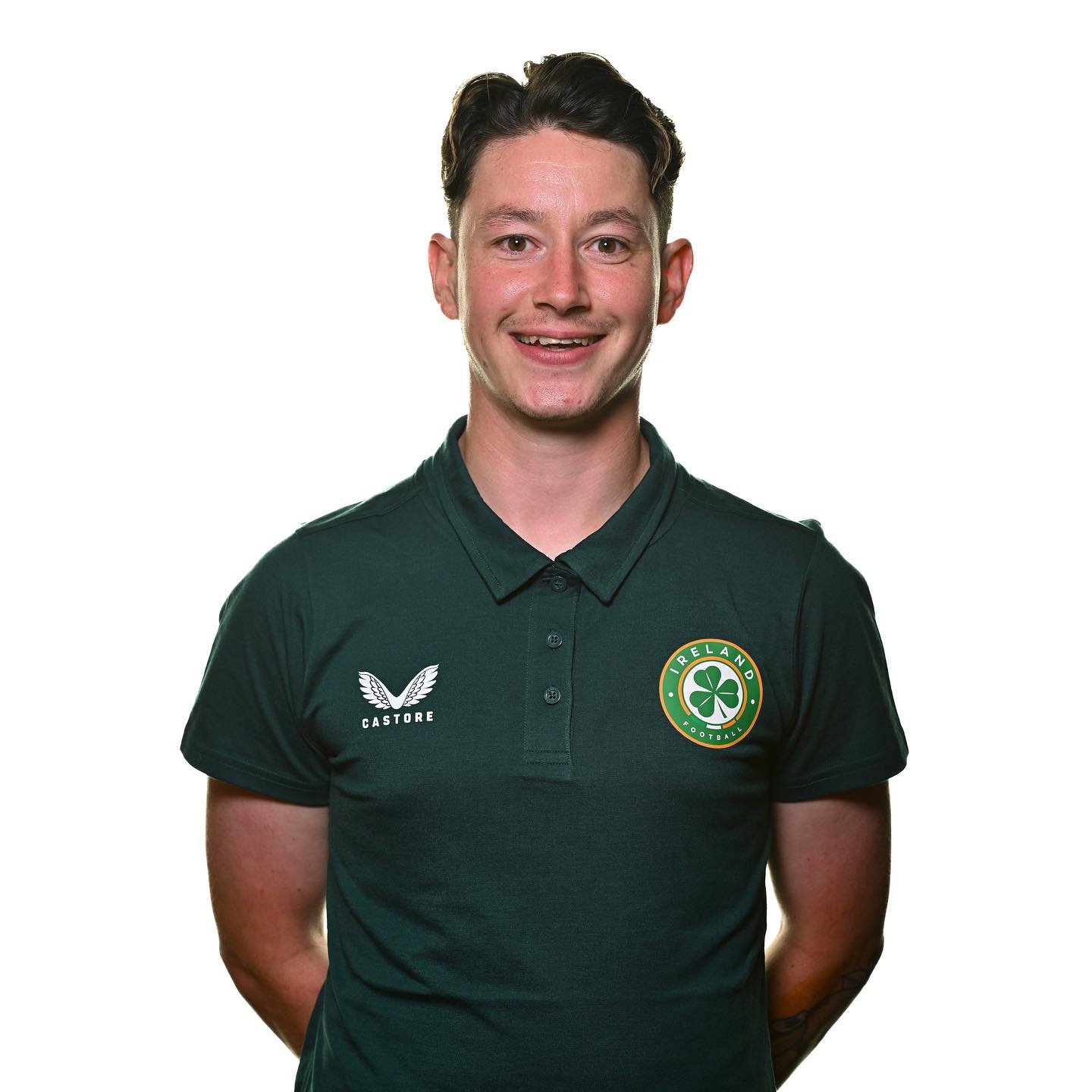
Séan Doyle
Currently Shelbourne FC WU17s assistant coach and the ROI WU19s Performance Analyst.
Formerly served as a performance analyst for Shamrock Rovers Women’s Senior team and Wexford Youths Senior team. Additionally, held the position of WU17 head coach at Wexford Youths. Previously worked as a recreational football coordinator at South East Technological University Carlow, also serving as an assistant and head coach for the men’s football teams. Currently in the final semester of a degree program in sports coaching and business management. Spent five years in Chicago, where involvement included AYSO Mundelein 372 and AYSO 300 United.
How would you define a parent’s role within the youth sports environment?
I’ve a habit of using analogies to better illustrate my point when coaching so I’ll do likewise here. See a strong, solid oak tree as the aspiration. To get to this aspiration, you must plant an acorn. The acorn takes nutrients from the rich soil and takes nurturing from environmental conditions such as rain and sunshine. Under the correct circumstances, the acorn will grow into an oak tree.
The youth athlete takes on a sport with their aspiration, be it for the social, physical and mental aspects or to become an elite or professional player. The coaching the youth receives can be seen as the soil to the acorn. It will provide technical, tactical and physical principles to develop growth. The better the coaching, the better the soil. The parents’ involvement can be seen as the environmental conditions. Too much or too little of a certain element may inhibit the growth of the youth athlete. With the correct balance, the athlete will be encouraged to grow towards their aspirations
The moral here is, that as much as youth players need to take on knowledge and ideologies from their coaches to reach their ambitions, they need appropriate nurturing from their parents to grow towards their goals. I feel the parents’ role is crucial in influencing the growth and development of a youth athlete.
What are the benefits of embracing parental involvement in youth sports?
Due to the influence of parents in the development of youth athletes, I believe their involvement in youth sports is paramount. Whatever the goal, parents’ investment in both the athlete and team is instrumental to success. The cooperation between coach, player and parent leads to an understanding of what, why and how things work. This in turn fosters a sense of trust and responsibility from parents as they become involved, part of the set-up and team. There is a mutual understanding of what is expected from both coach and parents, creating a versatile environment for the youth athlete to have the freedom to grow and prosper.
The most distinguished sports characters give credit to their parents for their influence in their early years leading to successes later in life. Even the illustrious and often crass senior coach Brian Clough understood the benefits of parental involvement saying; “I remain certain the character and disposition of children are established during those formative years.”
How have you as a coach/club attempted to increase parental involvement?
In all honesty, with my experiences to date, I’ve operated behind the front lines, so to speak, when it comes to parental involvement. That being said, parent relations is a skill I’m trying to build and improve on. The limited interaction I’ve had with parents has always been positive.
With my club in Chicago, AYSO Mundelein 372, we hold ‘Silent Days’ or ‘Día del Silencio’ every few weekends. Quite easy to understand, it promotes silence on the sidelines from coaches and supporting parents alike, allowing youth players to make their own decisions during gameplay without instruction. While it’s a policy that’s generally followed by parents, I’m uncertain if they understand the principle behind the activity. Also, at the end of practice sessions, I make a point of bringing in youth players and having them openly thank their parents. This is to highlight their importance to the players but also to show my appreciation for their support.
In contrast, parent involvement when coaching in Ireland seems somewhat limited. Parents are happy to leave the responsibilities to youth player development to coaches not understanding that youth player development requires a symbiotic partnership between coaches and parents. I have watched senior coaches hold group meetings to explain and illustrate the intentions, which I feel is a brilliant incentive. If anything, these meetings or parent interactions, in general, should be more frequent.
It goes without saying that I’ve always had, and will continue to make time for parents who have any queries or questions on youth player development, roles and responsibilities. I feel there are minor rifts, especially in my own involvement in coaching, that can be bridged with efforts to encourage parent involvement and understanding.
What challenges have you faced in attempting to increase the level of parental involvement?
As with any large unstructured task, where to start. Like coaching a player, the information as to be formatted, understandable and regulated. It’s impossible to give parents a long list of terms and conditions required to develop a youth athlete. On top of that, parents are more interested in the stuff that interests them. In contrast, they tend to disregard the finer details that aren’t as engaging though play just as much importance to the final product. After all that information, there’s the task of convincing parents to buy into the work required. And it does require work. It’s far easier to shrug off the responsibilities away from practices and games as something of sub-importance. Finally, the follow up questions parents ask. Often fair questions, they pose difficult answers, sometimes there aren’t even answers to give.
It’s difficult being asked questions I don’t know the answer to, then I must to explain that I don’t know the answer while convincing a parent I still know what I’m doing. Occasionally I’m asked questions I can’t answer openly for worry that a parent will take the answer as an insult rather than constructive criticism.
Have you seen any difference in players when parental involvement is embraced not neglected and/or ignored?
Yes. A former girls’ team at AYSO club in America we embraced parent participation and interest, leading to a very successful season. Their coach took the incentive early in the season to relate what I was working on back to the parents so they could understand. My objective wasn’t to see how many goals we could score, but how little we could concede. I was working on a more defensive team set up where typically there’s a big emphasis on attacking and scoring with the ball, especially at youth level. The coach of this girls’ team was open to this idea, seeing that after we took scoring and results out of the picture, we could focus more on development.
What I hadn’t expected was his initiative to relate this all back to the parents in the detail and frequency that he did. The parents now understood why we were working the way we were working. They were not only supportive of their own child but now the entire youth team, with every player being a regular at every training practice and family showing up en masse to show their support on game days. What intrigued me the most was that we had started the season with the intention of disregarding the results on the scoreboard and focusing on the technical results on the field. Due to the atmosphere set by parents and coaches alike, there was no pressure for the players. They were enjoying themselves and as a result of just that, they ended up earning their results both on the field and on the scoreboard.
What advice would you give coaches who are unsure and/or afraid about increasing parental involvement within youth sports?
Take the initiative and approach parents. Rather than seeing them as opposition to the style and ideas you coach, see them as part of your team. After all, if you can utilize the parents of your youth players, you’ll find that they’re a great asset to your team. In contrast to the few contact hours a week you have with your youth players, their parents will have the most. Take advantage of that. Understanding the way you incorporate the parents is important.
Rather than present a list of demands and requirements, demonstrate your reasoning, and ask questions and opinions. Though you are the coach, they are the parent. As I defined in my acorn analogy before, in terms of the development of the youth player, it’s much more efficient and prosperous to see and treat each other as an equal influence.
For those parents unaware of their influential role within youth sports, what advice would you give them?
Though surprisingly simple, I can appreciate that it’s easier said than done. That being said, my advice would be to encourage whatever your child aspires to do. To provide an anecdote to supplement my lack of experience on the subject, I’ve no hesitation in admitting my mother as a great example. When I decided I wanted to make a career out of football, it was an unprecedented risk. It would have been safer for my mother to convince me to pick a more cautious option. Instead, she actively supported my ambitions. My mother is also greatly influential in the manner and mindset with which I coach. I’m supportive of freedom of expression and mistakes. Trying new things, making mistakes and trying them again. I encourage players to be the individual they want to be in the game. Granted, I may be too lenient though that’s a consequence that’s yet to make an impression in my coaching career.
My mother isn’t the most prominent character when it comes to sport. She constructively used of her influence, nurtured and support me, for which I am thankful. Also, if I as a coach have any influence on a youth athlete, she’s now prominent in influencing them. My advice is to simply be there. Use your role to encourage and support your child’s aspirations and ambitions, not only in sport but any walk of life. I can promise you in turn that whatever your child does, they’ll enjoy doing, they’ll be thankful for it and your influence as a parent sets the pretext for the future.
Thank you to Séan for taking the time to complete the following interview questions.
Facebook: Sean Doyle | Twitter: @SeaneDoyle | LinkedIn – Sean Doyle


















